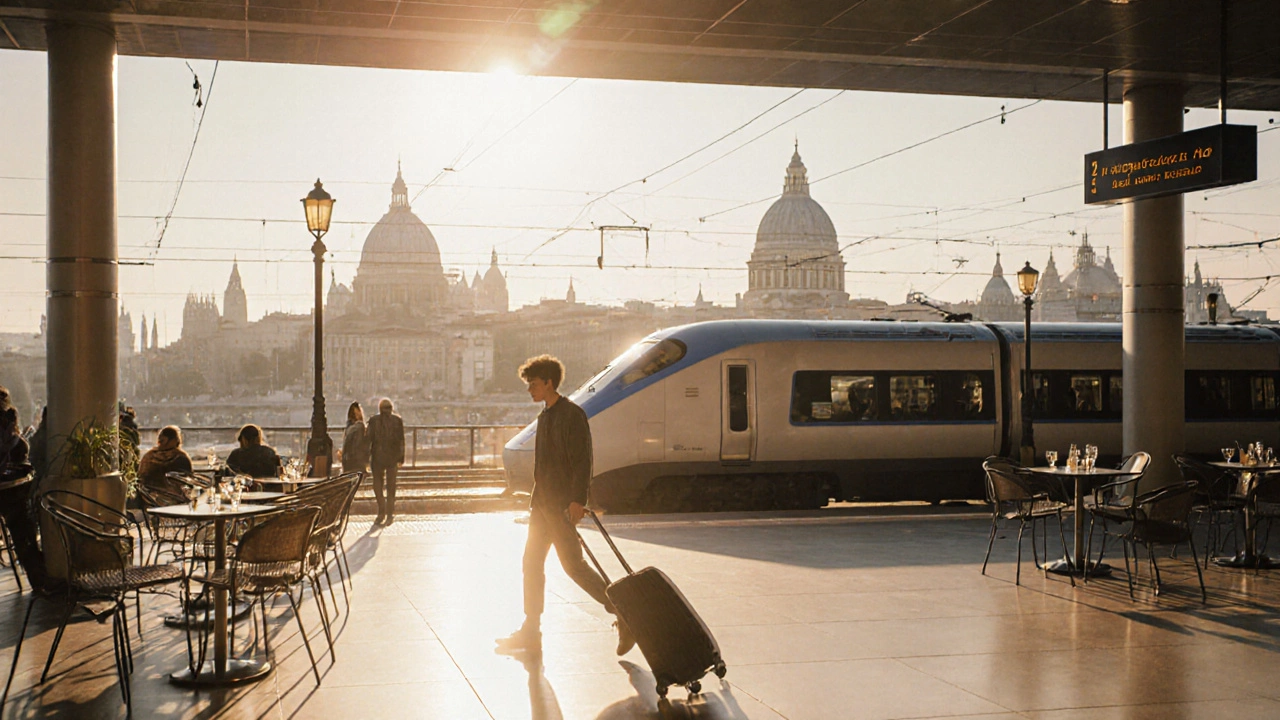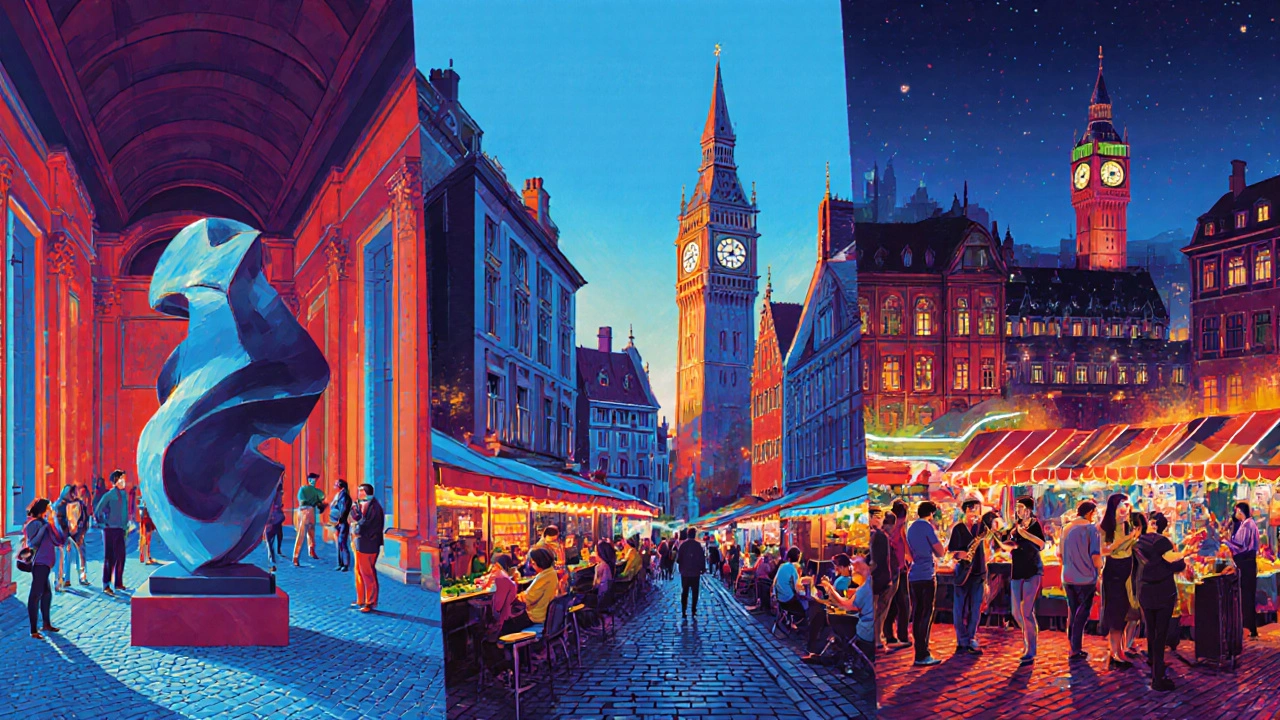Why People Choose City Breaks: 9 Compelling Reasons
 Oct, 8 2025
Oct, 8 2025
Why People Choose City Breaks: Interactive Reason Explorer
Convenience & Time Efficiency
Short trips with easy transport and central stays maximize your time.
Budget-Friendly Appeal
Lower per-day costs make city breaks more affordable than long vacations.
Cultural Immersion & Learning
Museums, historic sites, and local events offer rich experiences in little time.
Food & Nightlife Adventures
Diverse dining options and vibrant nightlife make short stays exciting.
Social & Relationship Benefits
Shared experiences and new connections enhance travel enjoyment.
Mental Health & Reset
Changing scenery improves mood and reduces stress significantly.
Spontaneity & Flexibility
Last-minute deals and adaptable plans suit modern travel preferences.
Practical Planning
Simple steps to plan a memorable city break without hassle.
Experience Over Itinerary
Focus on must-sees and leave room for unplanned discoveries.
Quick Comparison: City Break vs. Long Vacation
| Aspect | City Break | Long Vacation |
|---|---|---|
| Duration | 2–4 days | Weeks |
| Cost | Lower per-day | Higher total |
| Transport | Centralized, easy access | Often involves multiple transfers |
| Cultural Exposure | Intensive but brief | Detailed exploration over time |
| Stress Level | Low due to brevity | Can be high if overpacked |
Key Takeaways
- City breaks satisfy a craving for quick cultural immersion without taking too much time off work.
- They are often cheaper than longer vacations because flights and accommodation are shorter.
- Travelers enjoy the boost to mental health that comes from changing scenery for just a few days.
- Food, nightlife, and local events make short stays feel richer than the time spent.
- Planning a city break is simple: pick a destination, book transport, reserve a centrally‑located place to stay, and set a few must‑do experiences.
Ever wondered why a weekend in Barcelona feels more satisfying than a two‑week beach resort? The answer lies in what city breaks deliver: a compact dose of discovery, social buzz, and a mental reset that fits neatly into a busy calendar.
What Exactly Is a City Break?
City break is a short trip-usually 2‑4 days-focused on exploring an urban destination. It thrives on easy transport links, a concentration of attractions, and the ability to pack a lot of experiences into a tiny time frame. Think of it as a “mini‑vacation” where the city itself becomes the playground.
Convenience & Time Efficiency
Most people have limited vacation days. A city break lets you maximize those days with minimal travel friction. Direct flights, high‑speed trains, or even a short drive get you into the heart of the action within hours. Because you’re staying in a central location, you avoid long commutes, meaning more time for sightseeing and less time stuck in transit.
Budget‑Friendly Appeal
When you strip a trip down to essentials-transport, a modest hotel or Airbnb, and a few meals-the cost drops dramatically. A study by the European Travel Commission showed that short‑duration trips can be up to 30% cheaper per day than week‑long vacations. Budget‑travelers love city breaks for that reason alone.

Cultural Immersion & Learning
Urban centers concentrate museums, historic districts, and live events. A single street can hold centuries of history, while a downtown gallery showcases contemporary art. Visitors get a crash‑course in local heritage-something a beach resort rarely offers. For example, a weekend in Prague lets you wander the Charles Bridge, explore the Astronomical Clock, and sample Czech beer, all within a tight schedule.
Food & Nightlife Adventures
Foodies treat city breaks like a tasting menu. From street‑food stalls to Michelin‑starred restaurants, the variety is immense. Nightlife follows a similar pattern: rooftop bars, underground clubs, and cultural performances keep the excitement alive after the sun sets. The buzz of a city’s evening scene often turns a short stay into a memorable story.
Social & Relationship Benefits
Traveling with friends or a partner on a short trip can strengthen bonds. The limited timeframe forces shared decisions-what to eat, which museum to visit-creating teamwork moments. Solo travelers also benefit: staying in a bustling city reduces feelings of isolation and opens opportunities to meet locals and fellow tourists.
Mental Health & Reset
Research from the University of Cambridge links short trips with a measurable reduction in stress hormones. The change of scenery, combined with new experiences, gives the brain a “reset button.” Even a three‑day city break can improve mood, boost creativity, and prevent burnout.

Spontaneity & Flexibility
Because the planning horizon is short, you can be spontaneous. Last‑minute flight deals, pop‑up events, or a sudden invitation from a friend become easy to incorporate. This flexibility is a major draw for millennials and GenZ travelers who value experience over meticulous itineraries.
Practical Tips for a Memorable City Break
- Pick a well‑connected city. Look for destinations with direct flights or fast train links from your home base.
- Accommodation matters. Choose a centrally‑located hotel, boutique, or Airbnb to minimize travel time inside the city.
- Prioritize experiences over a packed agenda. Identify three “must‑see” attractions and leave room for wandering.
- Local transport tickets (day passes, bike‑share) often save money and time.
- Download offline maps and a translation app. A few minutes of preparation prevents getting lost.
- Try a local dish you’ve never heard of. Even a single culinary surprise can define the trip.
Quick Reference: Why People Choose City Breaks
| Reason | What You Get | Typical Duration |
|---|---|---|
| Convenience | Easy transport, central stay | 2‑4 days |
| Cost‑effectiveness | Lower per‑day spend | 2‑4 days |
| Cultural immersion | Museums, historic sites, festivals | 3‑4 days |
| Food & nightlife | Varied dining, bars, shows | 2‑3 days |
| Social bonding | Shared decisions, new connections | Any length |
| Mental refresh | Reduced stress, creativity boost | 2‑3 days |
| Spontaneity | Last‑minute deals, flexible plans | Any length |
Frequently Asked Questions
How far in advance should I book a city break?
For popular European capitals, booking 4‑6 weeks ahead secures good rates. If you’re flexible, last‑minute deals appear 2‑3 weeks before departure.
Is a city break suitable for families?
Absolutely. Choose family‑friendly cities with museums, parks, and easy transport. Keep the itinerary light and include kid‑oriented activities.
What’s the best way to save money on accommodation?
Book a centrally located hostel, boutique hotel, or an Airbnb shared space. Booking platforms often offer discounts for stays of 2‑3 nights.
How can I make the most of limited sightseeing time?
Prioritize one historic district and one cultural activity per day. Use hop‑on/hop‑off buses or city passes to reduce walking fatigue.
Do city breaks help with work‑related stress?
Research indicates that a short change of environment can lower cortisol levels by up to 15% within 48hours, offering a quick mental reset.
